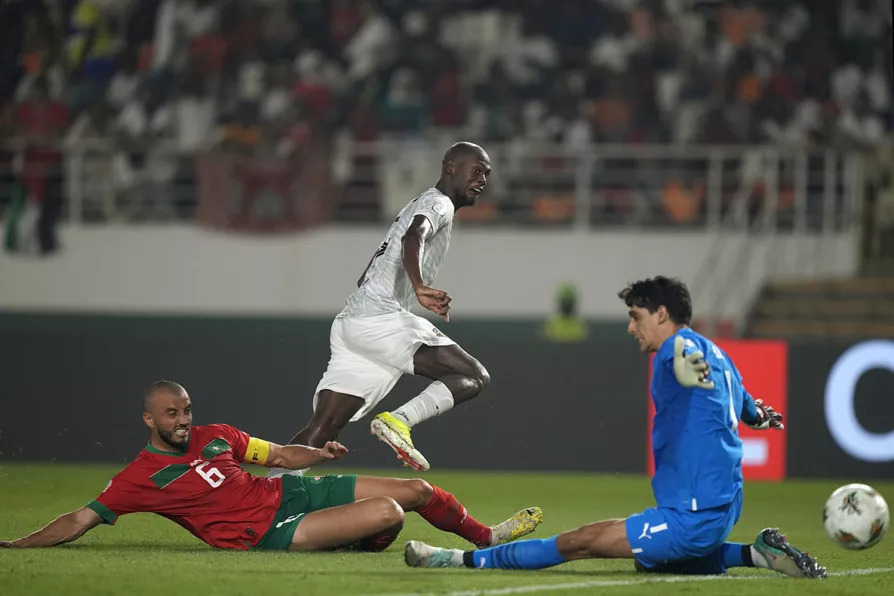
 South Africa's Evidence Makgopa (centre) scores his sides first goal past Morocco's goalkeeper Yassine Bounou (right) and Morocco's Romain Saiss during the African Cup of Nations round of 16 soccer match between Morocco and South Africa, at the Laurent Pokou stadium in San Pédro, Ivory Coast, January 30, 2024
South Africa's Evidence Makgopa (centre) scores his sides first goal past Morocco's goalkeeper Yassine Bounou (right) and Morocco's Romain Saiss during the African Cup of Nations round of 16 soccer match between Morocco and South Africa, at the Laurent Pokou stadium in San Pédro, Ivory Coast, January 30, 2024
THE defending champions are out. None of the quarter-finalists from the last edition are present at the same stage in this one. And there are no North African teams in the quarter-finals for the first time since 2013.
Normally these things would be a shock, but the way the 2023 Africa Cup of Nations has gone, none of it is.
Upsets have become the norm. The big African football nations who were often their own worst enemies in the knockout rounds came up against well-organised underdogs in the group stages.
In many ways, this tournament has been epitomised by the hosts Ivory Coast, the two-time Afcon winners who have somehow ended up as one of this edition’s biggest underdogs.
They scraped into the knockout rounds as one of the best third-placed teams. Although the word “best” is being far too kind to them here.
On the back of a poor group stage performance, Ivory Coast sacked their manager Jean-Louis Gasset even before they knew whether or not they would progress to the knockout stages.
As it turned out, they did progress, albeit unconvincingly, as the fourth of four out of six third-place teams to go through.
Senegal awaited Ivory Coast in the next round. The defending champions had been one of few pre-tournament favourites to live up to expectations in the group stage, so a last 16 tie against the worst group stage qualifier was surely a formality.
Not in this Afcon. Senegal took the lead early on through Habib Diallo, but a late Franck Kessie penalty sent it to extra time and eventually to a penalty shootout, which Ivory Coast won.
The hosts went from disappointing underachievers to an underdog story in the space of four games of one tournament.
Ivory Coast’s caretaker coach Emerse Fae had been fretting about the Senegal game all day in the build-up.
Was he worried about a big defeat, or was this nervousness due to the fact he thought his team could win?
“There was a lot of pressure before the match, and match day was too long for me,” said Fae.
“I couldn't nap as usual, thinking about all scenarios. If I said there was no pressure, I would be lying.”
Maybe even the idea they could win this game, regardless of where this idea came from, gave the players a hint of belief.
Maybe it was the extra worry about the occasion that made them more difficult to beat.
Or maybe it’s because there were now no expectations on Ivory Coast, despite them being hosts, that they were able to go on and cause an upset.
“Qualifying after Morocco’s win gave us confidence,” added Fae.
“We beat Senegal and eliminated them. Morale is good.
“We must not stop here. We must continue working, maintain this morale, and keep playing match by match.”
Ivory Coast now face Mali in the quarter-finals this afternoon, and no-one dares predict a winner.
Tomorrow’s other quarter-final sees Cape Verde take on South Africa.
Cape Verde have been the revelation of the tournament and the leader of the underdog charge, even going a step further and emerging as genuinely one of the best teams.
“It’s fantastic, we’ve taken another step forward but we haven't shown everything yet,” said Cape Verde midfielder Jamiro Monteiro, who is currently a free agent but last played club football for San Jose Earthquakes in MLS
“We can still do a lot, but the most important thing was to qualify for the quarter-finals.”
South Africa, meanwhile, have drawn on the power of Mamelodi Sundowns, the much talked about South African Premier Division champions who have enjoyed a relatively high global profile for a South African club team in recent months due to their style of play and success under coach Rhulani Mokwena.
Belgian coach Hugo Broos has brought some of this into the national team, primarily by including 10 Sundowns players in his squad. Only three of his squad play their club football outside South Africa.
At the time of writing, the winners of today’s quarter-finals between Nigeria and Angola, and DR Congo and Guinea are not known.
Nigeria have the best player still at the tournament in striker Victor Osimhen, but Angola recorded one of the best results in the last 16 with a 3-0 win against Namibia.
There is no real point in trying to predict a winner in any of these games, although the trick might be to pick who you think should win the game in normal circumstances, and go with the opposite.

Forward’s rise as the tournament’s leading scorer reflects a journey shaped by heritage and belief as Morocco reach the final, writes JAMES NALTON

Dabbagh and his Palestinian team’s World Cup campaign may have come to an end, but it has given fans hope amid war and tragedy, writes JOHN DUERDEN












